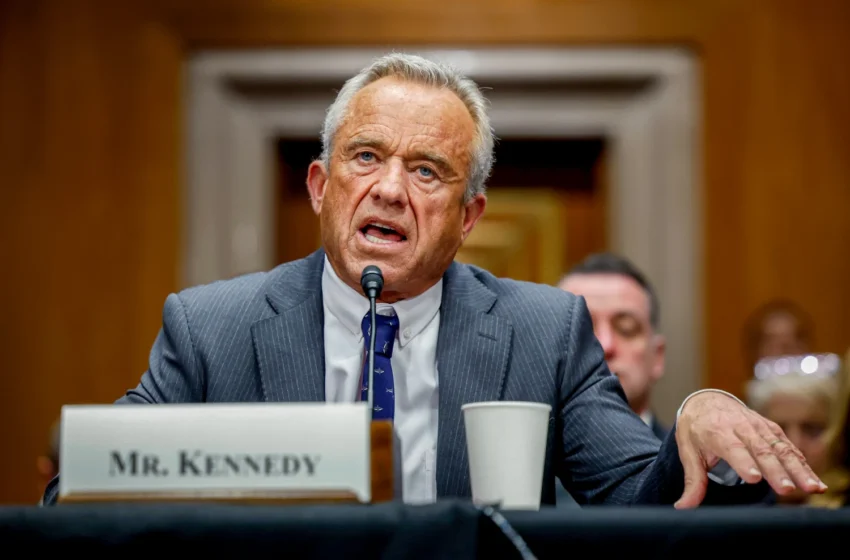mRNA Vaccine: Here’s why RFK Jr. pulled $500M in funding

RFK Jr. halts $500M in mRNA funding. Credit: Kevin Dietsch / Getty Images
On August 5, 2025, U.S. Health Secretary Robert F. Kennedy Jr. announced a sweeping termination of 22 mRNA-based vaccine research projects, citing safety concerns and limited effectiveness. The decision involves nearly $500 million in government contracts and investments managed by BARDA and Global Health Investment Corporation.
Kennedy, long recognized for his criticism of mainstream vaccines, declared that mRNA platforms for respiratory viruses like COVID-19, flu, and H5N1 “fail to protect effectively” and pose a risk when viruses mutate. He pledged to redirect funds toward “safer, broader vaccine strategies,” such as whole-virus vaccines and novel immunization technologies.
Projects Halted and Industry Impact
The canceled projects included contracts with leading pharmaceutical and biotech players such as Moderna, Pfizer, Sanofi Pasteur, CSL Seqirus, and research centers like Emory University and Tiba Biotech. While some final-stage trials, including certain Moderna flu vaccine effort, will be allowed to complete under watchful terms, no new mRNA vaccine work will receive federal funding.
Still, HHS clarified that non-respiratory uses of mRNA technology, like cancer therapy applications, are excluded from the cutbacks. These research areas remain intact and will continue under existing frameworks.
Kennedy’s Rationale: Safety Concerns and Policy Shift
Kennedy argued that mRNA vaccines struggle to offer comprehensive immunity against upper respiratory infections, pointing to their inability to prevent viral transmission. He warned that reliance on the technology could encourage antigenic drift and undermine long-term effectiveness, claiming some vaccines might even “prolong pandemics.”
His explanation was based on internal reviews and consultations with NIH and FDA experts. Kennedy maintained the decision was scientific in nature, despite expert critics who emphasize the life-saving role mRNA vaccines played throughout the COVID-19 crisis.
Expert Criticism: National Security and Preparedness Risks
Public health experts responded sharply. Mike Osterholm, a veteran infectious disease specialist, labeled the decision one of the most dangerous in his five-decade career.
Dr. Paul Offit, a respected vaccine researcher, underscored that mRNA technology has saved millions and is essential for biotech leadership. Critics argue that abrupt withdrawal of funding will undermine U.S. pandemic readiness and innovation momentum.
Others, including university researchers and analysts, warned of national security vulnerabilities. They described mRNA vaccines as critical tools for rapid response to emerging threats like avian influenza or bioterrorism agents. Reallocating these funds could create blind spots in future defenses.
Historical Context: From Pandemic Savior to Policy Controversy
During the COVID-19 pandemic, mRNA vaccines, developed by Pfizer/BioNTech and Moderna, were praised worldwide for their swift rollout and effectiveness, eventually earning recognition in the 2023 Nobel Prize in Medicine. The new leadership under Kennedy, however, is steadily dismissing mRNA efficacy, especially for respiratory viruses, amid ongoing measles outbreaks and evolving vaccine advisory panels.
Kennedy has already disbanded existing expert panels, removed pro-mRNA authorities, and appointed critics and skeptics to key roles, reshaping the vaccine governance structure within HHS. These moves form part of a broader strategy to center alternative platforms and vaccine skepticism.
READ ALSO
Is Chikungunya Virus the next pandemic threat after COVID-19?
Legionnaires’ disease outbreak: What to know about precautions and symptoms
What’s Next: Alternative Vaccine Strategy and Wider Implications
In lieu of mRNA, HHS says it will pursue universal vaccine candidates capable of providing robust protection across viral variants. Kennedy emphasized the agency’s commitment to developing resilient platforms that maintain effectiveness even as viruses mutate. However, critics point out few concrete alternatives have emerged, raising concern about the speed and feasibility of pivoting research pipelines.
Long-term consequences could include stalled innovation in fields like cancer immunotherapy, which also leverage mRNA approaches. Additionally, the political framing of vaccine policy may embolden anti-vaccine legislation and misinformation campaigns nationwide.
A Turning Point in U.S. Vaccine Policy
Robert F. Kennedy Jr.’s decision to halt half a billion dollars in mRNA vaccine research marks a dramatic shift in U.S. public health strategy. By questioning the safety and reliability of the same platforms that helped end the COVID-19 pandemic, his administration signals a new direction, prioritizing traditional vaccine methods and broader immunization strategies.
With public health stakes high and experts warning of diminished pandemic readiness, policymakers and citizens alike are left to weigh: is this a calculated reset, or a dangerous retreat from proven science?

